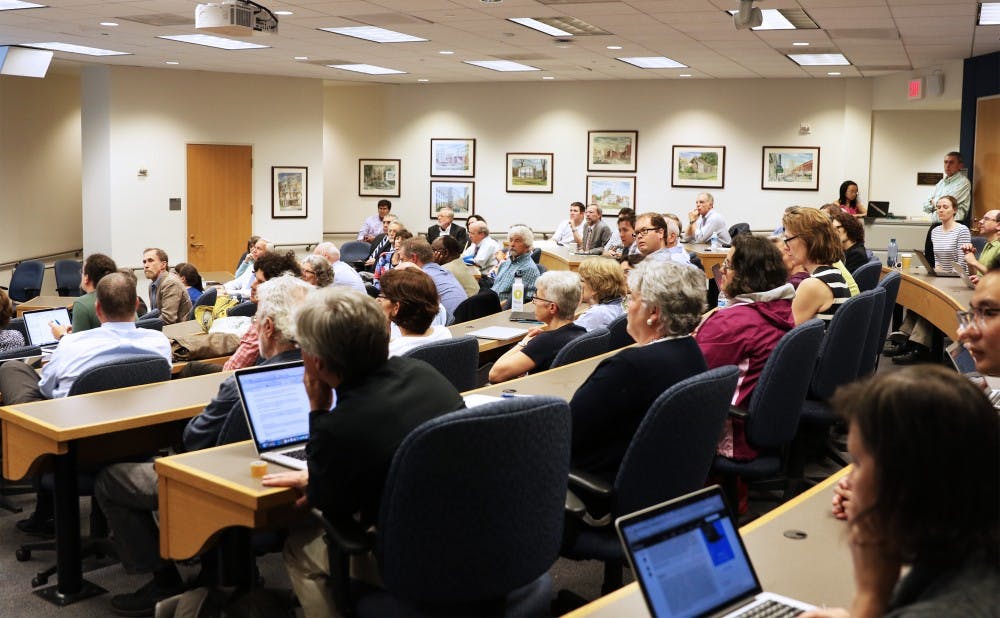The Academic Council passed a motion to endorse university leaders’ statement deploring House Bill 2 and tabled a motion calling for the Board of Trustees to conduct an independent review of the controversy surrounding Executive Vice President Tallman Trask at its meeting Thursday.
In response to the passage of House Bill 2 last month, President Richard Brodhead, Provost Sally Kornbluth and Dr. A. Eugene Washington—chancellor for health affairs and president and CEO of Duke University Health System—released a statement April 18 deploring the legislation “in the strongest possible terms” and urging its full repeal.
At the Academic Council meeting, faculty discussed a motion—introduced by members of the Executive Committee of the Academic Council—to endorse the University’s statement.
Aaron Franklin, associate professor of electrical and computer engineering, asked how common it was for the University to make political statements as it did against House Bill 2, and for such statements to be passed by the Academic Council as representative of the entire faculty.
In response, President Brodhead acknowledged that it was unusual for the University to take a position on political matters, but that the law was so broadly delegitimizing that it warranted a statement.
“The University never takes positions on specific parties or partisan matters. The University does not endorse candidates,” Brodhead said. “[But the law] was so sweeping and cuts so fundamentally into values of this community that we have a stake in it not only as citizens but specifically as people who are trying to recruit faculty and trying to get people to come to conferences here.”
Brodhead noted that the passage of House Bill 2 plays a role in students' decisions to accept Duke admissions offers.
Council members also debated the specificity of the statement's language used to summarize the impacts of the law.
Some said they felt the statement overly emphasized the LGBTQ community to the exclusion of other groups affected by House Bill 2 and should instead be more explicit about the specific groups discriminated against. Others felt that the language of the University’s statement was inclusive enough and should be left more general to avoid overlooking any potential impacts.
The motion to endorse Duke’s public statement against House Bill 2 was ultimately passed by the council.
The council also discussed a motion—introduced at last month's meeting by Karla Holloway, James B. Duke professor of English—for the Academic Council's representative on the Board of Trustees to ask the Board to initiate an independent review of the incidents involving Trask, reported in a Chronicle article.
Because Holloway was unexpectedly unable to attend the meeting due to illness, Kerry Haynie—associate professor of political science and African and African-American studies and member of the Executive Committee of the Academic Council—answered questions in her place.
James Cox, Brainerd Currie professor of law, criticized the motion’s lack of supporting documents and its unclear scope.
“The appropriate thing would be if we could have some discussion about what we think the issues might be—and it’s not clear to me what that would be—in which I think ECAC could then over meetings ... figure out if there’s something here,” Cox said. “But at the same time, I think there’s nothing here that raises the level that suggests that we should have some level of disapproval of the administration’s ability to clean its own stable.”
Richard Schmalbeck, Simpson Thacher and Bartlett professor of law, agreed with Cox, noting that he felt there was nothing to indicate that the review processes have been ineffective and that the motion was “unmistakably a vote of no confidence in the administration and its procedures.” Instead, he suggested that the motion be tabled instead of voted down.
Disagreeing with Cox and Schmalbeck, Trina Jones, professor of law, argued that the motion was not a vote of no confidence, but rather a way to underscore the concern faculty have for the staff. Jones also pointed to an email sent to the Duke community April 6 in response to student protests as evidence that the administration wanted an independent review as well. In the email, Brodhead wrote that the University will "engage a recognized, independent expert to review the grievance and complaint procedures for Duke staff in order to assess their fairness and effectiveness."
After the Council decided to table the motion, Schmalbeck clarified the definition of “tabling a motion.”
“It is deferred indefinitely or taken off the table by a vote of a majority of the body—at any time,” Schmalbeck said. “Given the nature of the concerns raised, this particular motion may never come up again, but efforts along the same line may.”
The Academic Council passed an additional motion to request that the Executive Council review Holloway’s original motion to determine whether there was a motion that could be moved forward to the general Academic Council.
In other business:
Get The Chronicle straight to your inbox
Sign up for our weekly newsletter. Cancel at any time.
Emily Klein, professor of earth sciences and chair of the Implementation Committee of the Academic Council’s Diversity Task Force, presented a proposed community statement affirming the University's commitment to fostering diversity. The statement, if adopted by the Academic Council, will be submitted to the Board of Trustees to encourage the adoption of a similar statement.
The council passed a proposal for a name change for the program in women’s studies to the program in gender, sexuality and feminist studies, which was discussed at the Academic Council meeting March 25.
Two new graduate programs were proposed: a master’s degree called Quantitative Management from the Fuqua School of Business by Bill Boulding, dean of Fuqua and J.B. Fuqua professor of business administration, and senior associate dean Jennifer Francis, and a Ph.D. called Computational Media, Arts and Cultures by Victoria Szabo—associate research professor of visual and media studies—and Deborah Jenson, professor of romance studies and director of the Franklin Humanities Institute.

